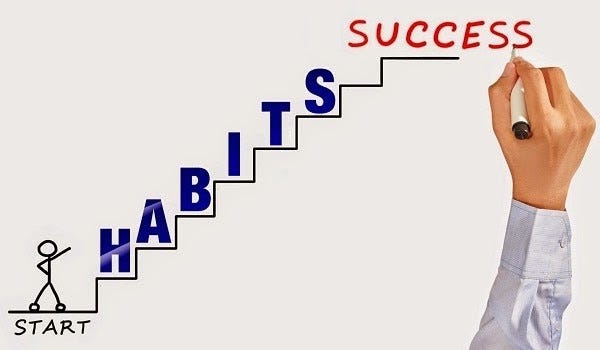Skills That Lead to Promotions, Raises, & Respect
Revealing the 2023 PMI Pulse of the Profession Report.
👋 Welcome to The Influential Project Manager, a weekly newsletter covering the essentials of successful project leadership.
Today’s Overview:
“Power” skills are becoming increasingly important for today’s project professionals. Some people also refer to them as “soft skills” or “interpersonal skills.” They are at the heart of leading successful teams, engaging stakeholders, and conquering challenges to the project plan.
PMI dove into the data from nearly 3,500 professionals in the field and found some surprising insights. According to the survey, the top 4 skills were: (1) communication, (2) problem-solving, (3) collaborative leadership, and (4) strategic thinking.
Bonus: Eight Work Habits That Matter. No matter what field of work, industry, or skill, some work habits are consistently appreciated. Many of these are so appreciated, when they are executed consistently, they lead to promotions, raises, and respect!
Today’s Newsletter is Proudly Presented by Sablono - Progress Reporting Made Simple!
Say hello to Sablono Track Free - your revolutionary, real-time construction tracker. It’s like a command center in your pocket, syncing you directly to your site….and guess what? It's 100% free!
Sablono delivers a complete, organized overview of every project detail. Effortlessly upload documents, photos, and notes, boosting your team's productivity and ensuring smooth collaboration with subcontractors.
Whether it's laying down foundations or the final touches of fitout, Sablono Track Free makes tracking progress a breeze. It's not just an app, it's your ticket to a smoother, smarter, and stress-free project management. Jump on Sablono Track Free now and lead your projects like a pro!
The Top 4 Power Skills for Today's Project Managers
Filed under: Project Management, Leadership & Managing People
“Hard skills get you in the door. But soft skills keep you in the room.”
Soft skills are becoming increasingly important for today’s project professionals. They are at the heart of leading successful teams, engaging stakeholders, and conquering challenges to the project plan.
Soft skills are the personal attributes that enable you to interact effectively with others, such as communication, teamwork, problem-solving, and time management.
Technical skills enable project managers to chart the path from the start of a project to close, but soft skills are how they bring the entire team along for the journey to execute a common vision.
Employers and owners now seek individuals who blend these soft skills with technical expertise. In this week’s article, we’ll dive into PMI’s Pulse of the Profession 2023 report, which uncovers the top four soft skills vital for career advancement in project management.
The Project Management Institute 2023 report offers valuable insights into these skills, as identified by the global project management community. You can download a copy of the report here:
Topics Discussed:
How power skills are critical to project value delivery and success.
What the project management community considers the most critical power skills.
Why cost and perceived value are barriers to prioritizing power skills development.
How organizations continue to struggle with assessing power skills in individuals and teams, and what they can do to turn this around.
What Exactly Are “Power Skills”?
PMI defines power skills as the special abilities, attributes, and behaviors that facilitate working well with others and help project professionals consistently succeed. Some individuals and other organizations also refer to them as “soft skills” or “interpersonal skills.”
Calling these abilities and behaviors “power skills” signifies the value they bring to professionals, teams, and organizations.
These skills are essential for building healthy relationships, communicating effectively, solving problems, and collaborating with others. Unlike hard skills, which you can measure or test, power skills are more about your personal qualities and how you handle situations. They're not as easy to quantify, but boy, are they important!
These include skills like:
Communication
Teamwork
Problem-Solving
Critical Thinking
Strategic Thinking
Adaptability
Time Management
Leadership
Creativity
Emotional intelligence
The Big Four for Project Management
PMI dove into the data from nearly 3,500 professionals in the field and found some surprising insights.
According to the survey, the top 4 most influential skills were:
Communication
Problem-Solving
Collaborative Leadership
Strategic Thinking
These skills ranked highest among PMI’s global sample, regardless of region, industry, years of experience, project management leadership level or PMP® status.
9 out of 10 folks in the PMI Annual Global Survey on Project Management agree that power skills help them work smarter.
Let’s dig a little deeper and explore each one.
1) Communication - The bridge that connects ideas to action.
“If you can think and speak and write, you are absolutely deadly. Nothing can get in your way.” - Jordan B. Peterson
Communication is the art of clearly conveying information, thoughts, and ideas. It involves the ability to effectively explain, write, articulate, public speak, and listen.
As a project manager, you're the linchpin of your project. Clear communication can prevent misunderstandings, align goals, and streamline the flow of information.
How to Improve: Practice active listening, tailor your message to your audience, and seek feedback on your communication style. Consider joining public speaking groups (like Toastmasters) or writing workshops (like Essay) to refine these skills.
2) Problem-Solving - The art of turning obstacles into opportunities.
"We cannot solve our problems with the same thinking we used when we created them." – Albert Einstein
Problem-solving is the ability to identify issues and develop practical solutions efficiently.
Projects rarely (if ever) go exactly as planned. Your ability to swiftly identify and solve problems can save time, resources, and maintain project momentum.
How to Improve: Engage in exercises like brainstorming sessions over a whiteboard and encourage a problem-solving culture within your team. Use the A3 problem solving framework to analyze and communicate to stakeholders.
3) Collaborative Leadership - Steering the ship together.
"If you want to go fast, go alone. If you want to go far, go together." – African Proverb
Collaborative leadership is about guiding and working alongside others, crossing boundaries, and building consensus to make decisions.
In today's interconnected world, a project manager must unite diverse teams, often across different departments or even geographies, towards a common goal.
How to Improve: Build an inclusive team environment, actively seek input from team members, and develop empathy to understand different viewpoints. Work on building trust within your team.
4) Strategic Thinking - Planning today with tomorrow in mind.
“Strategic Thinking helps to bridge between where you are and where you want to be.” — Pearl Zhu
Strategic thinking involves seeing the bigger picture, recognizing patterns, alternatives, and understanding how different decisions can lead to different outcomes.
Project managers need to navigate complexity and guide their projects strategically, considering both short-term objectives and long-term impacts.
How to Improve: Regularly set aside time to reflect on your project's direction. Stay informed about industry trends and think about how they might impact your work. Engage with mentors or peers to discuss and develop your strategic outlook.
BONUS: Work Habits That Matter
There are work habits that matter more than most. No matter what field of work, industry, or skill, some work habits are consistently appreciated.
There are work habits that matter more than most. No matter what field of work, industry, or skill, some work habits are consistently appreciated.
Many of these are so appreciated, when they are executed consistently, they ALSO lead to promotions, raises, and respect!
Here are 8 habits that I’ve found to really make a difference:
1) RESPONSIVENESS
A skill that lets colleagues and clients know you have heard their message and how you plan to respond to that message. It is appreciated because it demonstrates that you value others before yourself.
Responsiveness is evident in how you handle emails, phone messages, texts, and memos, including repeating and noting down verbal requests for accurate follow-up.
Responsiveness does not require that you comply with every request or agre to every demand, but it does require that you quickly let the messenger know they have been heard!
2) INITIATIVE
The ability to start or initiate a task without needing step-by-step instructions. It demonstrates the power to act independently and take ownership of a task or project.
It builds trust and confidence among supervisors and teammates, who can count on you to complete tasks using your own resources and skills.
It feels good to give someone a task with minimal instruction and believe that person will follow through and use their resources and talents to complete the task.
3) POSITIVE SELF-PRESENTATION
The way you offer yourself or present yourself for work. This is the impression you give others about what they may expect from you when you are completing a task.
You want to present yourself in a way that is positive and will instill confidence in others that you are competent and capable.
4) TIMELINESS
Timeliness is not the same as punctuality. It's more about being relevant, appropriate, and suitable. Timeliness is about organizing your time and tasks in a way so the most important thing gets done first.
Good timeliness also means not wasting time on trivial or unimportant matters. Timeliness is appreciated because is appreciated because it maximizes your employer’s ability to generate profit. After all, timely workers are the most productive workers.
5) PERSONAL WELLNESS
Doing your best to eat well, get plenty of sleep and exercise regularly is the core of personal wellness. The simple formula of healthy eating, sleep, and exercise does more for your body and mind than anything else.
Personal wellness is appreciated because it allows you to give your best to yourself and your employer consistently.
6) THOROUGHNESS
People in technical fields like engineering and architecture often have a natural talent for being thorough. But this doesn't always apply to every task.
Being thorough on a set of plans is one thing. Being thorough about reading and responding to emails is another.
The habit of thoroughness must be cultivated in all aspects of your work, not just in your areas of expertise.
7) DELEGATING WORK
When you delegate work tasks to your colleagues and team members, you become more efficient and make room for business growth.
When you try to do everything yourself, progress slows, you get stressed, and quality suffers.
Great leaders model good work and trust those following their leadership to do the same.
8) COMMUNICATING PROCESS
Communicating your process means keeping others informed about where you are in completing a task or providing requested information. Most never think about communicating process because they do not see the value in it.
This lets those who are depending on you know that you are working on what they need and whether you are on target or running behind. This is true for both external clients and internal teams.
Final Takeaways
It’s time to act! Sharpen these skills and watch your projects – and career – soar in 2024.
So, how can you and your company give power skills the spotlight they deserve?
Understand the connection between project success and power skills. It’s about stepping beyond the iron triangle of scope, cost, and time and valuing the human elements in project management.
Focus on nurturing the core power skills: (1) communication, (2) problem-solving, (3) collaborative leadership, and (4) strategic thinking. Make them a part of your organization’s culture. Let your project management leaders be the torchbearers, demonstrating and emphasizing these skills regularly.
Highlight power skills right from recruitment, making them a key part of the employment package. Integrate them into individual development plans and evaluate them during performance reviews.
Make sure your professional development programs reflect a commitment to these skills, backed by the necessary resources.
Remember, technical skills are important, but so is understanding interactions between people.
At the end of the day, projects are built by humans.
We need to appreciate that and work on it.
Until next week,
Kyle Nitchen
Thanks for reading! Want to work together?
📣 Sponsorships: Want to put your brand in front of construction project managers, leaders, and execs?
The Influential Project Manager is a digital publication reaching over 2,000 industry professionals and decision makers. Our readers rely on our free weekly newsletter to deliver valuable insights on effective project leadership and important industry updates.
☎ 1-on-1 Coaching
Are you interested in diving deeper into a particular topic or strategy? Book time with me for a 1:1 coaching or strategy session.
🎙 Interviews & Public Speaking
I’m available for podcast guest appearances and speaking engagements, focusing on leadership, construction project management, and continuous improvement. Interested in having me on your show or event? Let’s connect.
📧 Support this Newsletter
The Influential Project Manager articles will remain free, but if you find this work valuable, I encourage you to become a paid subscriber. As a paid subscriber, you’ll help support this work.
🎁 Refer Friends, Earn Rewards!
You're just 3 referrals away from unlocking my Construction Management, Lean, & IPD Resources ebook!









Thanks for sharing this. I'd go further and argue these skills aren't specific to project managers but apply broadly across many industries. It certainly applies to the work I do.